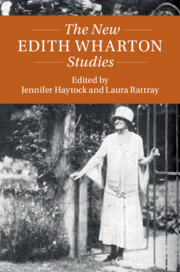Book contents
- The New Edith Wharton Studies
- Twenty-First-Century Critical Revisions
- The New Edith Wharton Studies
- Copyright page
- Contents
- Notes on Contributors
- Acknowledgments
- Editions and Abbreviations
- Introduction
- Part I Self and Composition
- Chapter 1 Creative Process and Literary Form in Edith Wharton’s Archive
- Chapter 2 Wharton’s Letters: Glimpses of the Whole Edith Wharton
- Chapter 3 Edith Wharton and the Business of the Magazine Short Story
- Part II International Wharton
- Part III Wharton on the Margins
- Part IV Sex and Gender Revisited
- Bibliography
- Index
Chapter 1 - Creative Process and Literary Form in Edith Wharton’s Archive
from Part I - Self and Composition
Published online by Cambridge University Press: 28 November 2019
- The New Edith Wharton Studies
- Twenty-First-Century Critical Revisions
- The New Edith Wharton Studies
- Copyright page
- Contents
- Notes on Contributors
- Acknowledgments
- Editions and Abbreviations
- Introduction
- Part I Self and Composition
- Chapter 1 Creative Process and Literary Form in Edith Wharton’s Archive
- Chapter 2 Wharton’s Letters: Glimpses of the Whole Edith Wharton
- Chapter 3 Edith Wharton and the Business of the Magazine Short Story
- Part II International Wharton
- Part III Wharton on the Margins
- Part IV Sex and Gender Revisited
- Bibliography
- Index
Summary
Edith Wharton’s archive consists of material held by over thirty institutions across North America and Europe. This essay demonstrates that the process of integrating the contents of Wharton’s archive into the study of her writing has been hindered not only by its immensity, generic diversity, and geographic distribution, but by its history. Sections of the essay address the uses of Wharton’s archive by her biographers; the significance of recently published archival documents which alter substantially our understanding of Wharton’s early career and work as a dramatist; material related to Wharton’s wartime experiences, a subject of renewed interest; and Wharton’s professional correspondence, especially her negotiations with her editors and publishers, which impacted the formal properties of Wharton’s fiction. The essay argues that Wharton’s archive remains a source of new information about the scope and variety of her achievements, and her creative processes.
Keywords
- Type
- Chapter
- Information
- The New Edith Wharton Studies , pp. 15 - 31Publisher: Cambridge University PressPrint publication year: 2019
- 1
- Cited by

